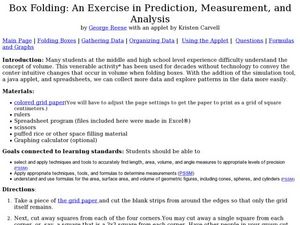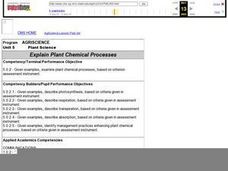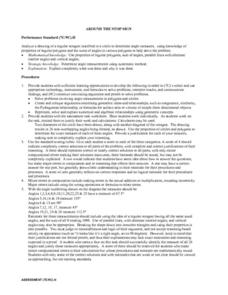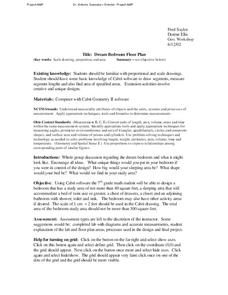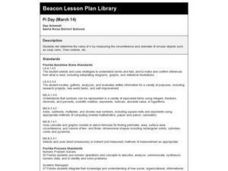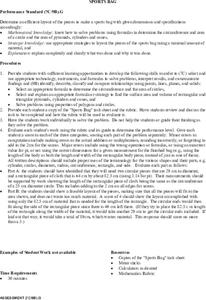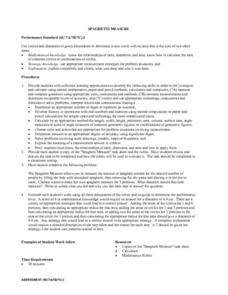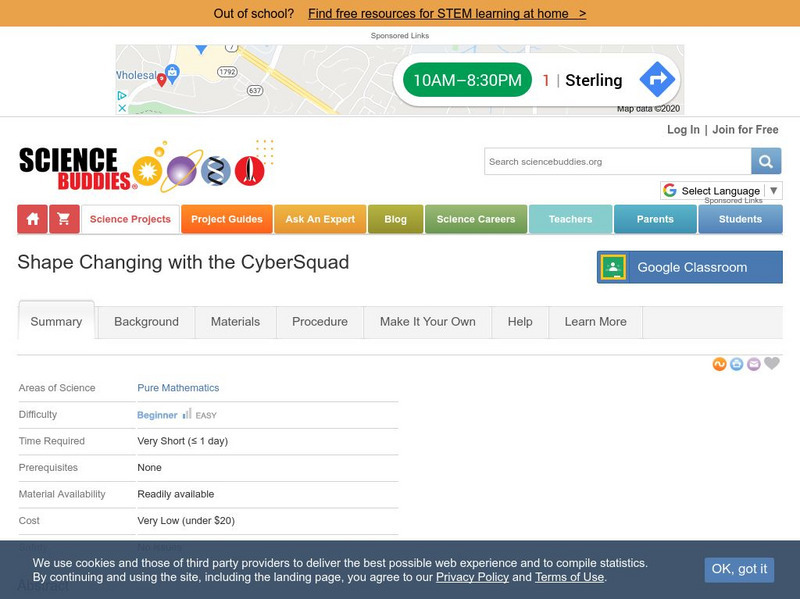Teach Engineering
The Amazing Aerogel
Introducing ... the aerogel. The first of a two-installment series teaches young engineers about the properties and uses of aerogels. A PowerPoint presentation provides information about this unique material to help solidify the concept.
Curated OER
Box Folding: Predict, Analyze and Measure
Young scholars predict the shape of a geometric figure in 3D. In this geometry lesson, students construct 3D shapes to perfect their knowledge of measuring and predicting. This assignment is also available as an online interactive lesson.
Curated OER
Explain Plant Chemical Processes
Students discover plant chemical processes through three lab activities. Overheads, data sheets, and teaching procedures provided for the unit covering photosynthesis, respiration, and transpiration.
Pennsylvania Department of Education
A Geometric Scavenger Hunt
Fifth graders connect their knowledge of polygons and polyhedrons. For this geometric shapes lesson, 5th graders identify and classify two- and three-dimensional objects. Students construct a polyhedron out of polygons and describe their...
Curated OER
Ratios of Similar Figures
Students identify the ratios of different triangles. In this geometry lesson, students identify the similarity and differences of triangles. They use the navigator to move the sides of the triangle around.
Curated OER
Around The Stop Sign
Young scholars analyze a drawing of a regular octagon inscribed in a circle to determine angle measures, using knowledge of properties of regular polygons and the sums of angles in various polygons to help solve the problem. They use...
Curated OER
Dream Bedroom Floor Plan
Students build and apply concepts of geometry. In this geometry lesson, students create a building using proportions and scale drawings. They use Cabri technology to create a virtual drawing first.
Curated OER
Dream Bedroom Floor Plan
Students construct using Cabri software. In this geometry lesson, students convert between units and apply the correct measurements to build objects. They create the room virtually and manipulate the shapes to the desired measurements.
Curated OER
Get the Turtle to the Pond
Young scholars solve problems. In this math activity, students write solutions using LOGO commands in order to help get the turtle to the pond.
Curated OER
Understanding Cloud Formation
Students view a demonstration that simulates cloud formation. They read a poem about clouds, participate in a class demonstration using warm water and ice and write a paragraph summarizing their observations.
Curated OER
Pi Day (March 14)
Fourth graders determine the value of ? by measuring the circumference and diameter of circular objects such as soup cans, Oreo cookies, etc..
Curated OER
Geometry Journal: Classifying Solids
In this geometry worksheet, 10th graders respond to journal prompts related to prisms and classifying solid shapes. The two page worksheet contains nine questions. Answers are included.
Curated OER
Geometry Scavenger Hunt
Learners use the digital camera, identify geometric shapes (in nature as well as man-made), and gain a better understanding of geometric vocabulary. They search for and recognize geometric shapes in unusual settings
Curated OER
Sports Bag
Students determine an efficient layout of the pattern pieces needed to make a sports bag with given dimensions and specifications. Given a word problem, data set and a diagram, students evaluate the information they have available and...
Curated OER
Spaghetti Measure
Students receive a copy of a "Spaghetti Measure" task sheet along with the scoring rubric. Students preview the task and the rubric prior to starting the task. tudeThey determine the circumference of a circle of spaghetti that will...
Illustrative Mathematics
Illustrative Mathematics: G Mg How Thick Is a Soda Can? Variation I
For this task, students are given the dimensions of a soda can and are asked to estimate its thickness. They must first find the surface area and the volume of aluminum. Aligns with G-MG.A.1 and G-MG.A.2.
TeachEngineering
Teach Engineering: Boxed in and Wrapped Up
Students find the volume and surface area of a rectangular box (e.g., a cereal box), and then figure out how to convert that box into a new, cubical box having the same volume as the original. As they construct the new, cube-shaped box...
Science Buddies
Science Buddies: Shape Changing With the Cyber Squad
In this project, you will make 2-dimensional templates, called nets, that fold up into 3-dimensional (3-D) shapes. By making shapes of different sizes, you will be able to see how 3-D shapes change with size. In your findings you will...
National Council of Teachers of Mathematics
The Math Forum: Building a Pyramid
This Math Forum lesson gives instructions on how to build a paper pyramid. Bonuses included finding the surface area and volume of the pyramid.
Alabama Learning Exchange
Alex: Popcorn Bucket or Box?
In this exploration, students will apply their knowledge of finding volume and surface area of cylinders and rectangular prisms. Students will make recommendations to the local movie theater after determining which package is cost...
Alabama Learning Exchange
Alex: Nifty Nets
During this activity, students will create nets for prisms. They will find the volume and surface area of the shapes. They will also use interactive activities to review three-dimensional shapes.This lesson plan was created as a result...



